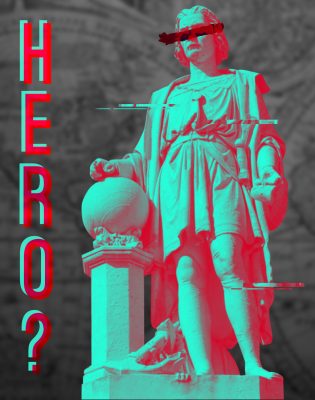Until this summer, Boston’s North End had boasted a Christopher Columbus statue since 1979 as a symbol of the local residents’ Italian heritage.
Columbus has become an incredibly polarized historical figure as more people become aware of the atrocities his colonization caused. In the battle between preserving history and memorializing controversial figures, this statue lost its head.
In June, the Columbus statue was beheaded, and out of concern for its architectural integrity, Mayor Marty Walsh is relocating it. But in recognizing the cultural ties many Italian Americans in the North End associate with Columbus, Walsh is committing to erecting a new statue in its place to commemorate their community’s history.

But beyond that basic respect for Italian culture, he isn’t doing much to appease those who oppose that Columbus will still exist in stone. The statue is still being placed in a public space, and simply moving it doesn’t address the central issue: if a statue is beheaded, we can assume people are angry about something.
Walsh’s decision seems to be a move meant simply to evade public backlash, making it rooted in performative activism. He is moving it not out of respect for the concerns people have with Columbus, but supposedly because it might be prone to damage again.
But in taking a step back to assess this debate, we must eventually wonder: why is Columbus still such a major figure in American history?
His impact on American life is quite arguable — he didn’t even discover America. We have no ancestral ties to him, yet we’ve known his name since elementary school.
While no historical figure is perfect, there are a slew of renowned Italians who had a much more positive impact on the world: renowned navigator Marco Polo, Nobel Prize winner Enrico Fermi and LGBTQ activist Vito Russo are just a few.
Yet at some point in the 20th century, Americans decided to latch on to this person who ultimately lost his noble titles after a failed attempt at colonizing the Americas. He inflicted disease, pain and death on Indigenous people, but his skill as a navigator makes up for it, right?
It can be argued that statues preserve history, but we must look at the context in which they are doing so. In the North End, we had a Columbus statue in a park called the Christopher Columbus Park — that’s rather excessive and celebratory. Putting the same statue in a museum, however, presents a different picture.
The United States also has a federal holiday to celebrate his life. It’s ludicrous that he is granted a day of reverence when his actual contribution to our country itself was so minute.
Many are now calling the holiday Indigenous Peoples’ Day to pay homage to the lives Columbus took. But this seems to be another effort at staying politically correct rather than addressing the problem.
No one really celebrates Columbus Day, so changing the name doesn’t cause any tangible societal change. Shouldn’t we go to school to learn and reflect on his horrors rather than blocking off a day to ignore them?
We can’t negate the fact that he was an incredibly skilled navigator. However, we grew up learning that his talents outshine his faults. This is what we’re taught when it comes to so many people in history.
We rave about George Washington but disregard that he owned slaves. Winston Churchill’s war tactics were incredibly inhumane and he held racist views, yet we still built schools in his honor.
Historical figures are often celebrated for their accomplishments, but in doing so, it’s easy neglect trying to see the complex humans they were. This underestimates the ability of children to learn about the nuanced duality of human nature, and results in a very shallow understanding of history from the beginning of our education.
This is a prevalent issue in the American education system, but it is not unique to our country. History is taught from the winner’s perspective, but with that mindset, we fail to admit that many of the “great” people we learn about also contributed atrocities to the world.
As society and its morals evolve, there comes a time when Columbus’ time as an American icon of navigation and expansion should be no more. If we truly want to keep this extra holiday, there are other names more deserving of the honor.


















































































































Dissapointed • Oct 12, 2020 at 5:44 pm
What a crock of communist bullshit !